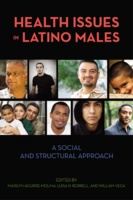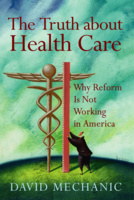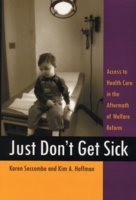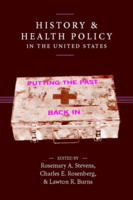Mapping "Race"
Critical Approaches to Health Disparities Research
The essays in this unique book argue for the inclusion of race as a social construction in the design of large-scale data collection efforts and how scientists must utilize race in the context of specific research questions. This landmark collection concludes on a prescriptive note, providing an arsenal of multidisciplinary, conceptual, and methodological tools for studying race specifically within the context of health inequalities.
Comrades in Health
U.S. Health Internationalists, Abroad and at Home
Structural Intimacies
Sexual Stories in the Black AIDS Epidemic
Structural Intimacies brings together scholarship on the structural dimensions of the AIDS epidemic and the social construction of sexuality to address the continuing HIV epidemic in the Black population, It asserts that shifting forms of sexual stories, structural intimacies, are emerging and presents a compelling argument: in an era of deepening medicalization of HIV/AIDS, public health must move beyond individual-level interventions to community-level health equity frames and policy changes.
The Door of Last Resort
Memoirs of a Nurse Practitioner
This memoir describes the education of nurse practitioners, their scope of practice, their abilities to prescribe medications and diagnostic tests, and their overall management of patients’ acute and chronic illnesses. In doing so, it explores the issues in primary health care delivery to poor, urban populations and investigates the factors affecting health care delivery in the United States that have remained obscure throughout the current national debate.
Making the American Mouth
Dentists and Public Health in the Twentieth Century
In the Public Interest
Medical Licensing and the Disciplinary Process
In the Public Interest investigates the mechanisms that democratic societies have used to certify that those working as licensed doctors are properly trained and supervised as they deliver critical services to the public. It analyzes the workings of the crucial public institutions charged with maintaining the safety and legitimacy of the U.S. medical profession and provides prescriptive measures, addresses problems in need of reform, and suggests new procedures, resource allocation, and education in medical oversight.
The Vulnerable Empowered Woman
Feminism, Postfeminism, and Women's Health
The Vulnerable Empowered Woman assesses the state of women’s healthcare today by analyzing popular media representations—television, print newspapers, websites, advertisements, blogs, and memoirs—in order to understand the ways in which breast cancer, postpartum depression, and cervical cancer are discussed in American public life. Tasha N. Dubriwny’s analysis concludes with a call to re-politicize women’s health through narratives that can help us imagine women, and their relationship to medicine, differently.
Beyond Health, Beyond Choice
Breastfeeding Constraints and Realities
Beyond Health, Beyond Choice is a multidisciplinary collection of essays written by thirty-seven contributors that examines the role of feminist theory in the promotion of breastfeeding by public health authorities. Essays are arranged thematically and consider breastfeeding in relation to health care; work and family; embodiment (specifically breastfeeding in public); economic and ethnic factors; guilt; violence; and commercialization.
The Health Care Safety Net in a Post-Reform World
The Health Care Safety Net in a Post-Reform World examines how national health care reform will impact safety net programs that serve low-income and uninsured patients. With contributions from leading health care scholars, it is the first comprehensive assessment of the safety net following enactment of national health care reform.
The Morning After
A History of Emergency Contraception in the United States
The Morning After tells the story of emergency contraception in America from the 1960s to the present day and, more importantly, it tells the story of the women who have used it. Side-stepping simplistic readings of these women as either radical feminist trailblazers or guinea pigs for the pharmaceutical industry, medical historian Heather Munro Prescott offers a portrait of how ordinary women participated in the development and popularization of emergency contraception, bringing a groundbreaking technology into the mainstream with the potential to alter radically reproductive health practices.
The Morning After
A History of Emergency Contraception in the United States
The Morning After tells the story of emergency contraception in America from the 1960s to the present day and, more importantly, it tells the story of the women who have used it. Side-stepping simplistic readings of these women as either radical feminist trailblazers or guinea pigs for the pharmaceutical industry, medical historian Heather Munro Prescott offers a portrait of how ordinary women participated in the development and popularization of emergency contraception, bringing a groundbreaking technology into the mainstream with the potential to alter radically reproductive health practices.
Patient Citizens, Immigrant Mothers
Mexican Women, Public Prenatal Care, and the Birth Weight Paradox
According to the Latina health paradox, Mexican immigrant women have less complicated pregnancies and more favorable birth outcomes than many other groups, in spite of socioeconomic disadvantage. In Patient Citizens, Immigrant Mothers, Alyshia Gálvez takes us from inside the halls of a busy metropolitan hospital’s public prenatal clinic to the Oaxaca and Puebla states in Mexico to look at the ways Mexican women manage their pregnancies. The book is both a migration story and a look at the ways that immigrants are received by our medical institutions and by our society.
Testing Baby
The Transformation of Newborn Screening, Parenting, and Policymaking
Testing Baby is the first book to draw on parents’ experiences with newborn screening in order to examine its far-reaching sociological consequences. Newborn screening occurs almost always without parents’ consent and often without their knowledge or understanding, yet it has the power to alter such things as family dynamics at the household level, the context of parenting, the way we manage disease identity, and how parents’ interests are understood and solicited in policy debates. Rachel Grob’s cautionary tale explores the powerful ways that parents’ narratives have shaped this emotionally charged policy arena.
Testing Baby
The Transformation of Newborn Screening, Parenting, and Policymaking
Testing Baby is the first book to draw on parents’ experiences with newborn screening in order to examine its far-reaching sociological consequences. Newborn screening occurs almost always without parents’ consent and often without their knowledge or understanding, yet it has the power to alter such things as family dynamics at the household level, the context of parenting, the way we manage disease identity, and how parents’ interests are understood and solicited in policy debates. Rachel Grob’s cautionary tale explores the powerful ways that parents’ narratives have shaped this emotionally charged policy arena.
Neurasthenic Nation
America's Search for Health, Happiness, and Comfort, 1869-1920
Neurasthenic Nation investigates how the concept of neurasthenia, the ill effects of modern civilization such as insomnia or impotence, helped doctors and patients, men and women, and advertisers and consumers negotiate changes commonly associated with “modernity.” Combining a survey of medical and popular literature on neurasthenia with original research into rare archives of personal letters, patient records, and corporate files, David Schuster charts the emergence of a “neurasthenic nation”—a place where people saw their personal health as inextricably tied to the pitfalls and possibilities of a changing world.
Patients as Policy Actors
Patients as Policy Actors offers groundbreaking accounts of one of the health field's most important developments of the last fifty years--the rise of more consciously patient-centered care and policymaking.
Patients as Policy Actors
Patients as Policy Actors offers groundbreaking accounts of one of the health field's most important developments of the last fifty years--the rise of more consciously patient-centered care and policymaking.
An Alternative History of Hyperactivity
Food Additives and the Feingold Diet
Fit to Be Tied
Sterilization and Reproductive Rights in America, 1950-1980
Medical Professionalism in the New Information Age
With computerized health information receiving unprecedented government support, a group of health policy scholars analyze the intricate legal, social, and professional implications of the new technology. These essays explore how Health Information Technology (HIT) may alter relationships between physicians and patients, physicians and other providers, and physicians and their home institutions.
Medical Professionalism in the New Information Age
With computerized health information receiving unprecedented government support, a group of health policy scholars analyze the intricate legal, social, and professional implications of the new technology. These essays explore how Health Information Technology (HIT) may alter relationships between physicians and patients, physicians and other providers, and physicians and their home institutions.
Health Issues in Latino Males
A Social and Structural Approach
Diagnosis, Therapy, and Evidence
Conundrums in Modern American Medicine
Practice Under Pressure
Primary Care Physicians and Their Medicine in the Twenty-first Century
Making Room in the Clinic
Nurse Practitioners and the Evolution of Modern Health Care
Cultivating Health
Los Angeles Women and Public Health Reform
Cultivating Health, an interdisciplinary chronicle, details women's impact on remaking health policy, despite the absence of government support. Combining primary source and municipal archival research with comfortable prose, Jennifer Lisa Koslow explores community nursing, housing reform, milk sanitation, childbirth, and the campaign against venereal disease in late nineteenth and early twentieth century Los Angeles. She demonstrates how women implemented health care reform and civic programs while laying the groundwork for a successful transition of responsibility back to government.
From Pink to Green
Disease Prevention and the Environmental Breast Cancer Movement
From Pink to Green successfully explores the intersection between breast cancer activism and the environmental health sciences, incorporating public and scientific debates as well as policy implications to public health and environmental agendas.
Medical Research for Hire
The Political Economy of Pharmaceutical Clinical Trials
Under the Radar
Cancer and the Cold War
Doctors Serving People
Restoring Humanism to Medicine through Student Community Service
The Contested Boundaries of American Public Health
The Truth About Health Care
Why Reform is Not Working in America
Tuberculosis and the Politics of Exclusion
A History of Public Health and Migration to Los Angeles
Abel’s revealing account provides a critical lens through which to view both the contemporary debate about immigration and the U.S. response to the emergent global tuberculosis epidemic.
Just Don't Get Sick
Access to Health Care in the Aftermath of Welfare Reform
Community Health Centers
A Movement and the People Who Made It Happen
Suffering in the Land of Sunshine
A Los Angeles Illness Narrative
The Dilemma of Federal Mental Health Policy
Radical Reform or Incremental Change?
Fighting For Our Lives
New York's AIDS Community and the Politics of Disease
Fighting for Our Lives is the first comprehensive social history of New York's AIDS community-a diverse array of people that included not only gay men, but also African Americans, Haitians, Latinos, intravenous drug users, substance abuse professionals, elite supporters, and researchers. Looking back over twenty-five years, Susan Chambré focuses on the ways that these disparate groups formed networks of people and organizations that-both together and separately-supported persons with AIDS, reduced transmission, funded research, and in the process, gave a face to an epidemic that for many years, whether because of indifference, homophobia, or inefficiency, received little attention from government or health care professionals.
History and Health Policy in the United States
Putting the Past Back In
In History and Health Policy in the United States, seventeen leading scholars of history, the history of medicine, bioethics, law, health policy, sociology, and organizational theory make the case for the usefulness of history in evaluating and formulating health policy today. In looking at issues as varied as the consumer economy, risk, and the plight of the uninsured, the contributors uncover the often unstated assumptions that shape the way we think about technology, the role of government, and contemporary medicine. They show how historical perspectives can help policymakers avoid the pitfalls of partisan, outdated, or merely fashionable approaches, as well as how knowledge of previous systems can offer alternatives when policy directions seem unclear.
Together, the essays argue that it is only by knowing where we have been that we can begin to understand health services today or speculate on policies for tomorrow.





































